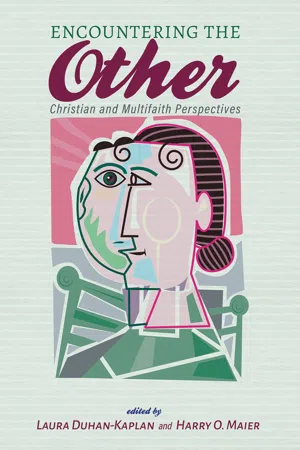
Encountering the Other
Christian and Multifaith Perspectives
- 268 pages
- English
- ePUB (mobile friendly)
- Available on iOS & Android
Encountering the Other
Christian and Multifaith Perspectives
About this book
How do religious traditions create strangers and neighbors? How do they construct otherness? Or, instead, work to overcome it? In this exciting collection of interdisciplinary essays, scholars and activists from various traditions explore these questions. Through legal and media studies, they reveal how we see religious others. They show that Jewish, Christian, Islamic, and Sikh texts frame others in open-ended ways. Conflict resolution experts and Hindu teachers, they explain, draw on a shared positive psychology. Jewish mystics and Christian contemplatives use powerful tools of compassionate perception. Finally, the authors explain how Christian theology can help teach respectful views of difference. They are not afraid to discuss how religious groups have alienated one another. But, together, they choose to draw positive lessons about future cooperation.
Frequently asked questions
- Essential is ideal for learners and professionals who enjoy exploring a wide range of subjects. Access the Essential Library with 800,000+ trusted titles and best-sellers across business, personal growth, and the humanities. Includes unlimited reading time and Standard Read Aloud voice.
- Complete: Perfect for advanced learners and researchers needing full, unrestricted access. Unlock 1.4M+ books across hundreds of subjects, including academic and specialized titles. The Complete Plan also includes advanced features like Premium Read Aloud and Research Assistant.
Please note we cannot support devices running on iOS 13 and Android 7 or earlier. Learn more about using the app.
Information
“Is This Your God . . . Killer of Children?”
Exodus: Gods and Kings
Table of contents
- Title Page
- Religious Pluralism and Public Life
- Contributors
- Acknowledgments
- Abbreviations
- Introduction
- Esau My (Br)other
- “I Consider Them Shit”
- Friendship between Muslims, Christians, and Jews
- Encountering Difference and Identity in South Asian Religions
- Religious Courts on Trial
- We Are All Outsiders
- Dogs as the Other in St. Augustine’s City of God
- “Is This Your God . . . Killer of Children?”
- Encountering the Other
- Vibration of the Other
- “Unitive Being” in the Face of Atrocity
- Searching for the Sacred Other in the Palestinian/Israeli Conflict
- For the Love of Strangers
- Hindu Traditions
- Indigenous People as the Other
- The Constructive Iconoclasm of Lamin Sanneh
- Light from a Dark Horse
- From Other to Brother
- Christianity without Enemies